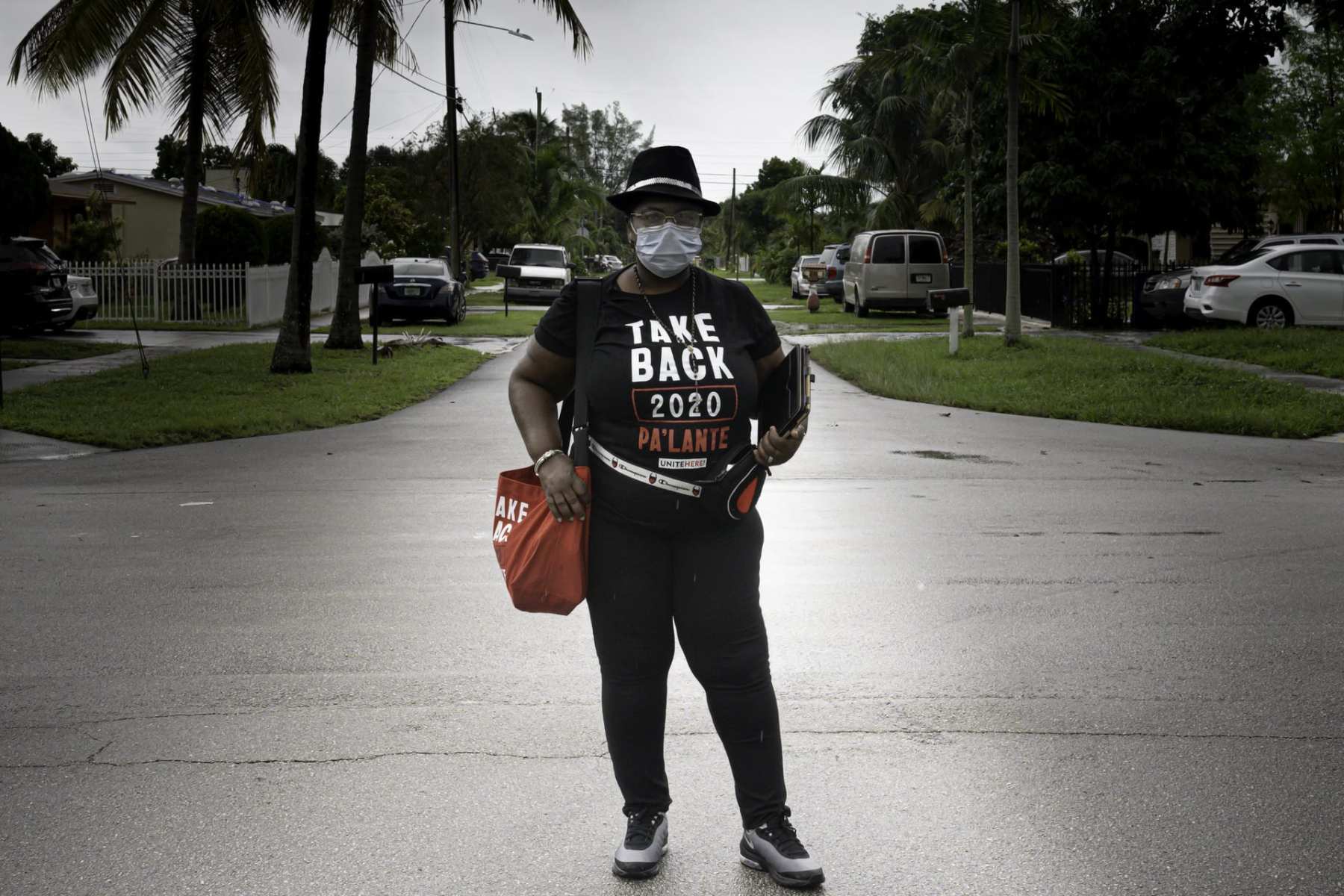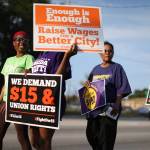After she was laid off from her airline catering job in March, Nirva Jean Paul felt stress morph into a daily companion. The rent went unpaid, the bills sat untouched, her children went hungry and, all the while, her despair grew.
Her $11.10 an hour job, one she’d held for seven years, had never covered much more than the basics. She had nothing saved. It took seven weeks for her first unemployment check from the state to arrive — $275 for her family of four.
Jean Paul, 53, believed it was crushing stress that sent her to the hospital in August — until she learned it was COVID-19, detected in her asthmatic lungs. The single mom spent two weeks there, thinking mostly of her three sons and how they were managing without her.
If her job paid better, if she’d had enough to save for a time like this, could it have been different? Her answer, she knew, was on the ballot in November.
This fall, Florida will vote on Amendment 2, an initiative to raise the state’s minimum wage. The increase will be tiered over time, from $8.56 today to $10 in September 2021, then $1 a year until it hits $15 in 2026. The tipped wage would also rise, from $5.54 today to $11.98 by 2026.
The move could change the lives of people like Jean Paul.
“With the extra money, I would be able to pay my bills, to pay everything,” she said. Without it? “I can’t live like this.”
Florida is a hub for low-wage work, much of it driven by its massive tourism industry, which took the hardest hit when coronavirus spread this year and sent workers like Jean Paul home. Thousands have been laid off at theme parks, hotels, restaurants and at airports, where Jean Paul worked loading trays of food onto planes. Most of those affected by job losses are women, who nationwide make up two-thirds of the lowest-paying workforce.
In Florida, 1.4 million women would benefit from a minimum wage hike, compared to 1.1 million men, according to an analysis by the Florida Policy Institute, a left-leaning think tank. Passing Amendment 2 could help narrow the gap between what men and women are paid — in Florida, women earn 85 cents for every $1 men earn, a little better than the national average of 82 cents on the male $1.
Black workers as a whole would see the largest jump of any group, and of those, 38 percent are women compared to 31 percent of men.
“[Raising the minimum wage] is the number one policy for closing the gender gap,” said William Spriggs, an economics professor at Howard University and a former assistant secretary for policy at the Department of Labor during the Obama administration.
But some small businesses who have seen their revenues evaporate during the pandemic worry an increase in this business climate could mean mounting costs, increased prices and cuts to employee hours. Tens of thousands of small businesses have already closed across the country.
“Companies are closing now,” said Carol Dover, president and CEO of the state’s restaurant and lodging association, the group leading the campaign against Amendment 2. “I have hundreds and hundreds of businesses saying that’s the last nail in the coffin.”
Whatever happens in Florida could be an indicator of what’s to come in the national push for a federal minimum wage, a movement that has gained momentum in recent years, reaching as far as Democratic presidential nominee Joe Biden. In his economic platform, Biden calls for raising the federal hourly minimum wage of $7.25 to $15 and eliminating the tipped wage of $2.13 an hour.
“Florida is a bellwether state,” said John Morgan, the Orlando-based attorney who got the nearly 800,000 signatures needed to put the constitutional amendment on the ballot. The last time Florida passed a minimum wage hike was in 2004, when it tied increases to inflation. Since then, the state’s starting wage has budged by less than $1 when adjusted for inflation.
That’s why after years of inaction by the state legislature, Morgan chose to put the decision to voters. (He led a similar legislative sidestep in 2016, spearheading efforts to legalize medical marijuana; the initiative passed in Florida with more than 70 percent support — the first southern state to do so.)
Allynn Umel, organizing director for the Fight for $15, the group that has been pushing for $15 minimum wage increases across the nation, said a passage in Florida would be a “tremendous victory” for the movement, particularly because of the impact it would have for Black workers, many of them women, who are concentrated in the South. One in four live in Florida, Texas and Georgia (both Texas and Georgia use the federal minimum wage of $7.25).
To support the measure, workers like why Jean Paul, the airline catering worker, have taken to knocking on doors and calling voters as part of an initiative with service workers union Unite Here to inform them of the amendment in the month before the election.
“This is my dream,” she said. “I need this change.”
But small business owners like Sandra Shorting have concerns. She pays more than minimum wage to her staff of three at The Naked Cupcake, a custom cake and cupcake bakery in Orlando, but she wonders how the increased wages will raise the cost of operating her business.
Will the cost of milk and eggs rise, too? And what about her plans to hire a cake decorator for about $15 an hour — will she have to pay $20 an hour or more now?
“If I have to move all my employees up to $15, then I can’t move them any higher than that for a very long time,” Shorter said. “In fact I’m going to have to find ways to cut their hours and make payroll and make my business continue to profit. It’s still a business.”
It’ll be another calculus to consider after a very challenging year, Shorter said.
But because the change will be gradual and universal, it’s unlikely to have a disproportionate impact, said Ben Zipperer, an economist at the Economic Policy Institute who is an expert in the minimum wage.
“When you raise the minimum wage, one way that businesses pay for it is they charge higher prices,” Zipperer said. “But, not only is that business going to do it — all its competitors are going to do that, too. That’s one way that businesses are actually able to accommodate higher minimum wage increases.”
The subject of minimum wage hikes is one of the “most well-researched topics in labor economics,” he said. Concerns that raising the minimum wage could stymie business and cause employers to cut hours, reduce staff or close altogether, don’t “really play out in the data,” Zipperer said.
There is some impact, though. In Seattle, for example, where the minimum wage rose in 2016, already employed workers largely benefited from the hike. But those without prior experience seeking jobs were having a harder time getting hired according to one study by economists at the University of Washington.
In 2019, the Congressional Budget Office found that raising the federal minimum wage to $15 would boost wages for 17 million workers. About 1.3 million other workers could become jobless, the office estimated.
Several studies have also shown that boosting wages leads to increased consumer spending, something that could help boost the post-pandemic economy.
With the extra money, I would be able to pay my bills, to pay everything.
Nirva Jean Paul, who was laid off in March
Morgan, the attorney leading the push in Florida, said another reason he’s championed this issue is because the cost of living has skyrocketed and wages haven’t kept up. In Orlando, where he lives, Disney workers sleep in their cars and the city is wrestling with the worst affordable housing shortage in the nation.
Most of the people feeling the brunt of those crises are women, who nationally have consistently higher rates of poverty than men. Male renters making the median wage and working full-time can afford a modest one-bedroom apartment at the national fair market rate, but a woman earning the female median wage cannot, according to an analysis by the National Low Income Housing Coalition.
The Congressional Budget Office study found that the number of people living in poverty would fall by 1.3 million, with a $15 minimum wage hike. And women would be more likely than men to move out of poverty.
“Look at the prices of beef, look at rents,” Morgan said. “Everything has gone up except wages. How is that fair? How is that sustainable?”
But Dover, of the restaurant association, said it shouldn’t be up to businesses to fix enormous structural problems like rent inequity.
“One of our biggest challenges in this state is that so many areas are charging way too much for housing. I don’t even think $15 an hour is going to help there,” she said.
If base wages go up, Dover said, it’s also an affordability issue.
“Everything costs more — everything — from your food, to daycare, to any commodity that you can think of,” she said.
Patricia Brigham, president of the League of Women Voters of Florida, said she understands how difficult this change could be to businesses, especially this year. But the concerns of low-wage workers are paramount. Amendment 2 is the only issue the non-partisan group is supporting on the ballot this year.
“There’s this perception that if you’re working a low-income job that you’re not as good as somebody who’s a doctor or a lawyer, and that really is unfortunate,” Brigham said. “Those are critical roles those workers fill. So I think we need to address these affordability issues and make sure that we provide as much support for low-income people as possible.”
Jessica Ewing, who owns an event security business in Orlando, knows she’s going to have to prepare if the minimum wage initiative passes. She may have to pay more competitive salaries or raise prices.
But before Ewing was a business owner, she was a low-wage employee at McDonald’s, Walmart and a call center. She is voting for Amendment 2.
“My husband and I were able to find our way out of the minimum wage life, not only through education but also through starting our business,” Ewing said. “People who are working minimum wage, the least that we can do is support the fact that they should be getting paid more for what they do. Their job is not any easier than ours.”
Proponents of wage hikes say Florida’s proposal does not go far enough. The restaurant industry is one of the largest employers of women in the United States — and many of those workers are tipped.
They will be left out of the largest increases in the bill.
Under Florida’s amendment, tipped workers would gradually see their wages rise from the tipped wage of $5.54 to $11.98 an hour by 2026. About 66 percent of tipped workers in Florida are women, according to the National Women’s Law Center.
“It’s great that Florida is doing this, but it’s got to be a first step,” said Saru Jayaraman, president of One Fair Wage, a non-profit working to end the tipped wage. “Not only does it leave literally hundreds of thousands of women and women of color out, but it also basically exempts the largest employers of minimum wage workers.”
Companies like Disney and Darden Restaurants (which owns Olive Garden) have an enormous presence in Florida and employ large swaths of tipped workers, Jayaraman said, meaning some of their staff will not be held to the $15 requirement.
For small businesses, Dover said the jump from $5.54 to $11.98 will put even more pressure on employers.
“Establishments will tell you, ‘We can’t afford that kind of an increase,’” Dover said. “So what they will do is there will be no more tips allowed.”
Morgan agreed that the amendment should go further. But because it needed a supermajority to pass — at least 60 percent of the vote — he decided to keep most of the hike to the regular minimum wage.
“This is not what I want; this is what I have to take to get it to pass,” said Morgan, who added that raising the tipped wage some will ensure a higher starting wage for tipped workers, particularly for women of color who face lower tips due to racism and sexism.
Poverty rates in the restaurant industry are more common for women, Black workers and Latinx workers. Women of color are at the intersection of these groups, and are more likely to be waitstaff and bartenders, often making less than their male counterparts.
So far, polling shows there is support for Amendment 2. A most recent poll, from Monmouth University last month, found that 67 percent of voters supported the measure.
The pandemic might have something to do with that.
“People are angry,” Jayaraman said.
Many tipped workers were denied unemployment insurance when coronavirus took their jobs because they made too little to even qualify. To get unemployment insurance, people need to work a minimum number of hours and earn more than a certain threshold during what states call a “base period,” or the months prior to a worker becoming unemployed that are used as a reference for how much they should get in benefits. For tipped workers, employers are required to report tips as a part of their income, but cash tips are particularly difficult to track and underreporting is common. So because tipped workers are already making less than the minimum wage in some cases, many end up falling short of the necessary threshold.
The hope, Jayaraman said, is that Florida’s proposal will spur a larger movement — and turn people out to the polls. In the past, minimum wage hikes have been a “meaningful political force” motivating workers to engage in voting.
“For most people the presidential election doesn’t mean shit in their lives,” Morgan said. “The only thing that makes their life better is a pay raise — that’s something to hold on to.”






